Redditor's Pet Cockatiel Gets Loud And Causes Chaos When She Leaves, So Her Mom Threatens To Get Rid Of It
Most people believe that taking care of pets is easy, especially if it's a smaller pet like a bird, because they assume that all you have to worry about is food, water, and the occasional cleaning that needs to be done. They'd be surprised to learn that most small pets demand plenty of time and attention from their owners if they want to take care of them properly.
The number of pets with separation anxiety is surprisingly high, and it's something we see all the time when reading these stories on Reddit. As hard as it is to take care of pets, it becomes much more challenging when the pet has separation anxiety because everything is great as long as you're there with your pet, but as soon as you leave, the pet can't handle it, so it will go crazy in your home and destroy things.
This Reddit user decided to share her story about her pet cockatiel that she's had since she was 8 years old, and everything was going great until the pandemic. The pandemic changed everything because they were all spending more time at home with the cockatiel, which developed a special bond with OP, leading to separation anxiety. So, every time she left the house, the cockatiel would go crazy.
It became so bad that the cockatiel would squawk for minutes on end, even if OP left the room for just a few minutes. To top it all off, the bird also likes chewing on things. OP was getting tired of it because every time she left the room, the cockatiel would start squawking loudly, and OP would get yelled at by her parents.
OP loves the bird with all her heart, but it's easy to understand how living like this can be exhausting for someone, especially since she plans on leaving for college soon, which would mean that the cockatiel would be alone far too much.
Her mother threatened her that when she moved off to college, she would get rid of the bird, and OP just can't handle all this stress regarding the bird.
OP has had her pet cockatiel for a long time, and she always tried to take care of it as much as possible and show affection for it
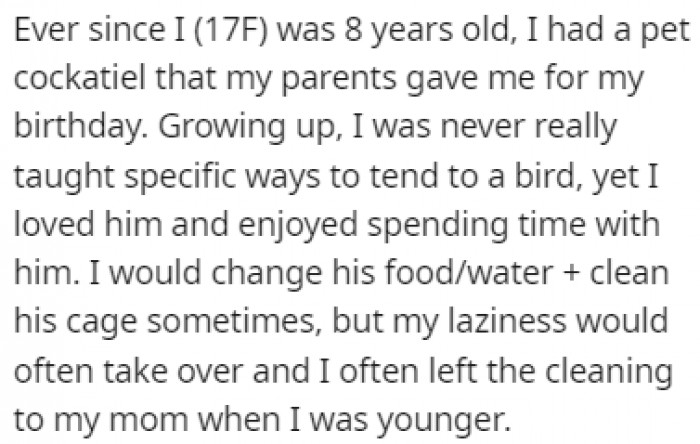
The issues started during the pandemic because the cockatiel got used to its owner being around all the time
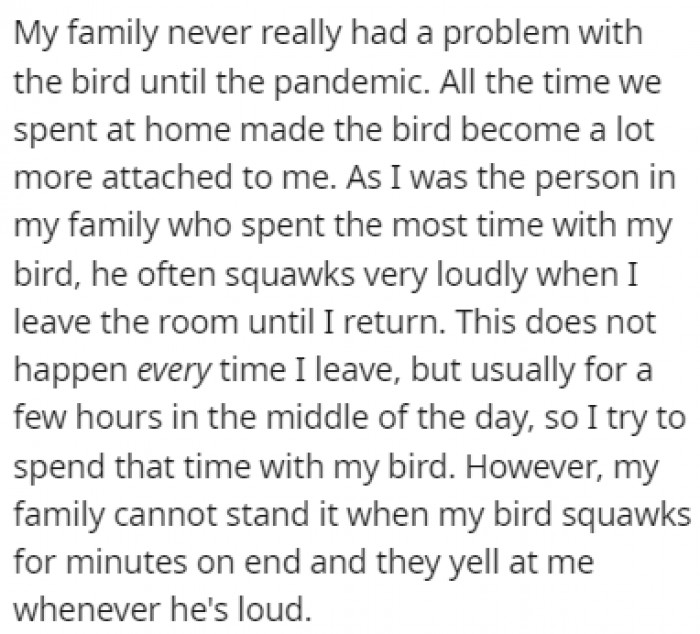
The bird also likes to chew on things like the mother's plants and furniture
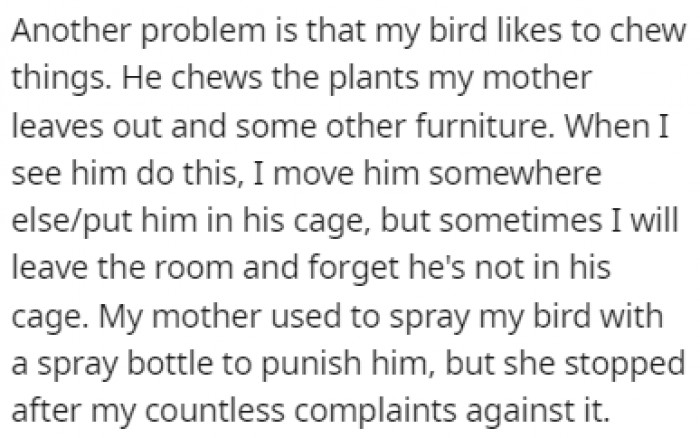
Understanding Separation Anxiety in Pets
Separation anxiety is a common behavioral issue in pets, particularly in birds like cockatiels.
Dr. Nicholas Dodman, a veterinary behaviorist, explains that these pets can experience distress when their owners leave, often leading to problematic behaviors.
Understanding the underlying causes of separation anxiety is essential for effective management and treatment.
The Psychology Behind Animal Behavior
Dr. Rachel Adams, an animal behaviorist at the University of Minnesota, explains that many pets, like cockatiels, display behaviors driven by anxiety, particularly separation anxiety. Research indicates that these animals may perceive their owners as a source of safety, leading to distress when left alone.
This behavior can result in loud vocalizations and chaotic actions as the bird attempts to communicate its discomfort. Understanding these behaviors helps owners respond effectively to their pets’ needs, often requiring enhanced training and environmental adjustments.
OP's mother says that she isn't doing enough to take care of her birds, but OP claims she's doing the best she can
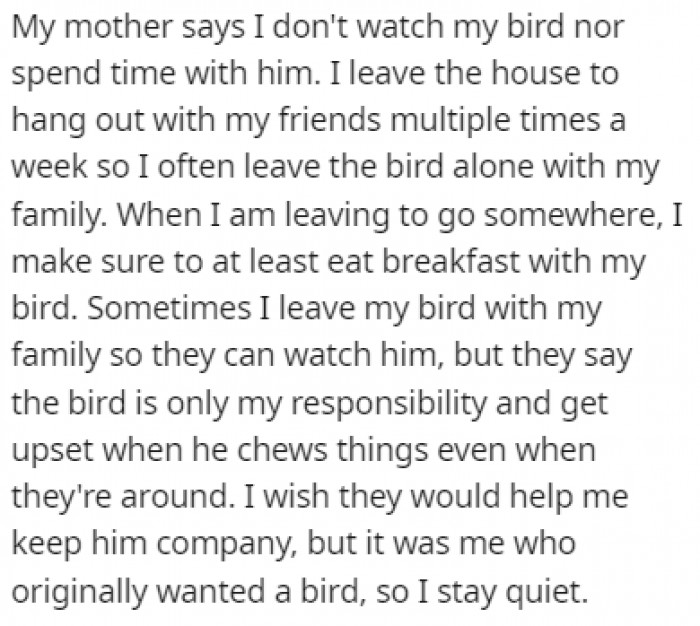
OP plans on leaving for college soon, which would cause even more issues
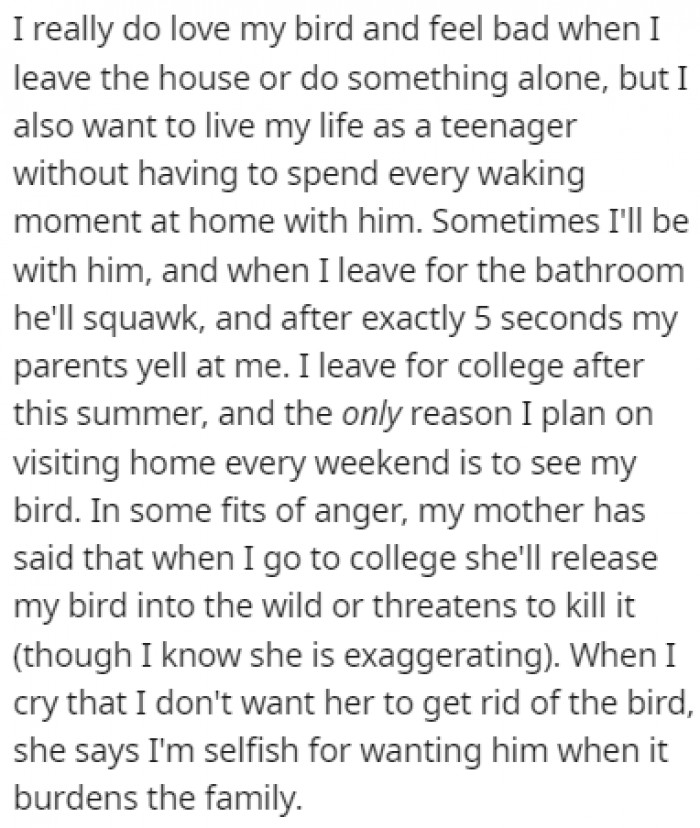
OP doesn't believe she deserves all the stress that's put on her
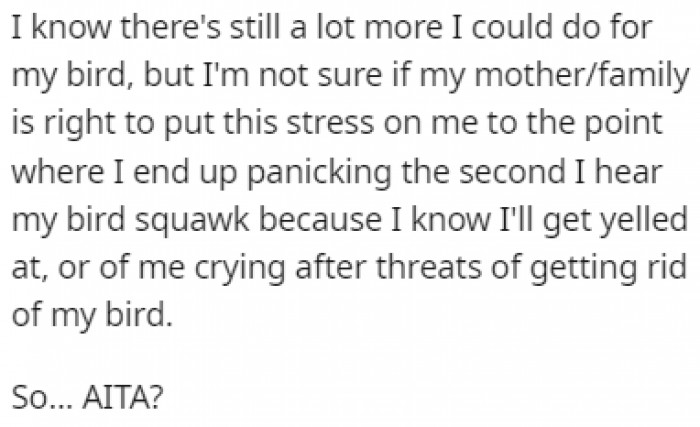
Research indicates that pets can form strong attachments to their owners, leading to anxiety when those bonds are disrupted.
According to the Journal of Veterinary Behavior, pets with separation anxiety may exhibit symptoms such as excessive vocalization, destructive behavior, and physical distress.
Recognizing these signs early can lead to more effective interventions.
Additionally, studies show that animals with separation anxiety often benefit from gradual desensitization techniques. By slowly increasing the time spent apart from their owners, pets can learn to feel more secure in their independence. This approach is supported by behavioral research and has been shown to reduce anxiety levels significantly in many cases.
Implementing structured routines can also help pets feel more secure, as predictability in their environment fosters a sense of safety.
A lot of Redditors in the comments suggested re-homing the bird
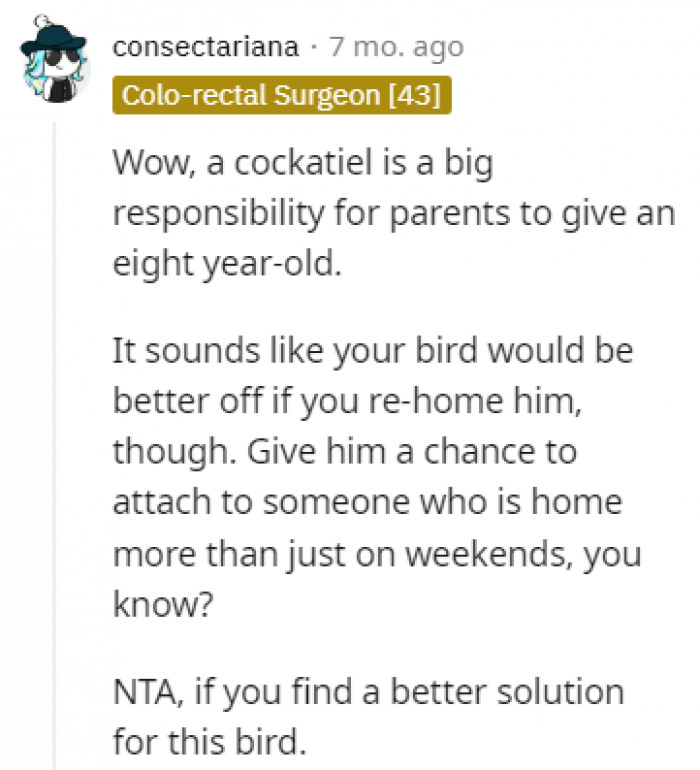
The opinions in the comments were mixed
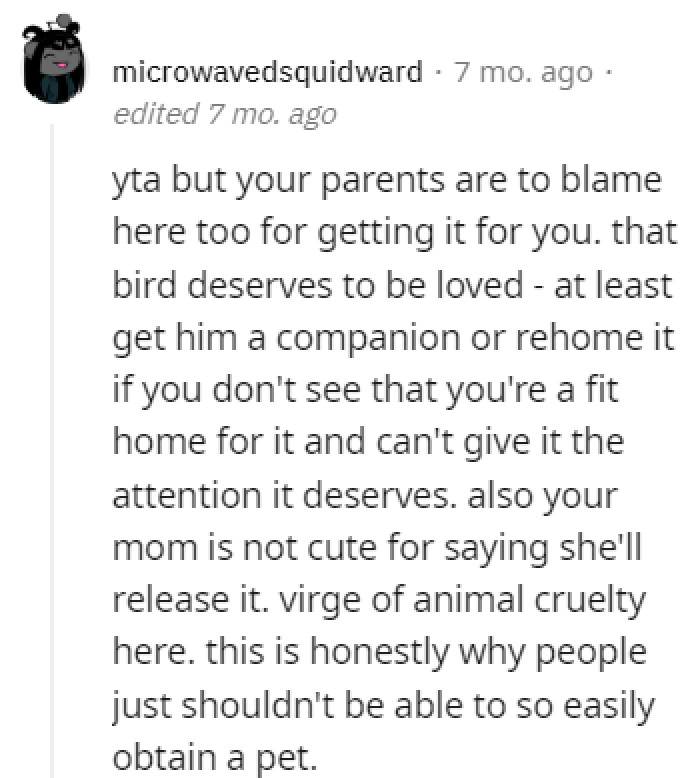
Not fair to the bird
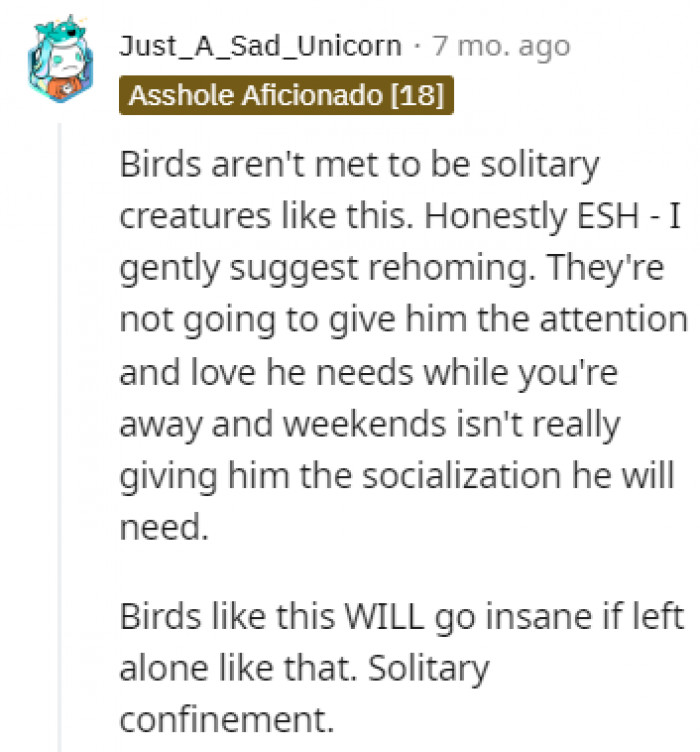
Behavior Modification Techniques
Implementing behavior modification strategies can help alleviate separation anxiety in pets.
Techniques such as desensitization and counter-conditioning have been shown to be effective in reducing anxiety symptoms.
Veterinary behaviorists recommend gradually increasing the time pets spend alone to help them adjust to separations.
Understanding the Owner's Role in Pet Behavior
From a psychological perspective, pet owners play a crucial role in shaping their pets' behavior. Researchers suggest that an owner's emotional state directly influences their pet's well-being. When owners are stressed, their pets often mirror that anxiety, creating a feedback loop that can exacerbate behavioral issues.
Recognizing this dynamic allows owners to take proactive steps in managing their emotional health, which can, in turn, help their pets feel more secure and calm.
Think before adopting
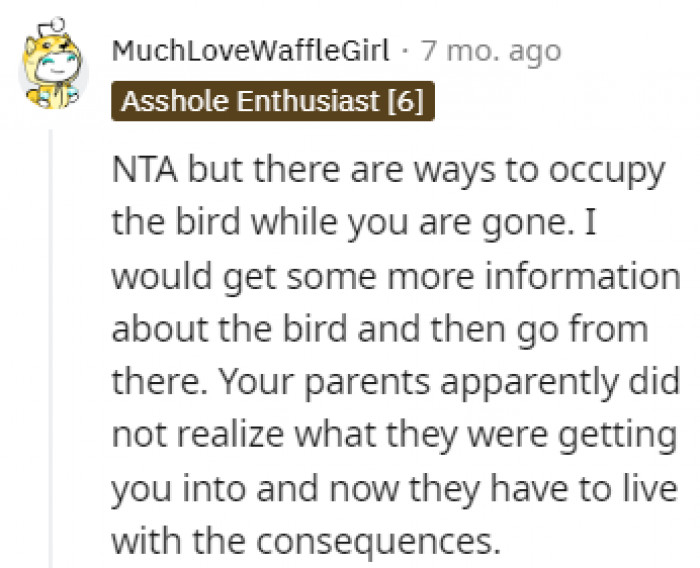
The comments left by other Redditors who attempted to help OP with her problem were mixed, as some people blame OP while others believe that it's the parents' fault for letting their daughter adopt a bird. We've seen what they had to say, and now we want to hear your opinion.
To manage the chaos caused by a loud cockatiel, practical strategies can include establishing a consistent routine that includes designated playtime and quiet time. Research suggests that pets thrive in structured environments, and applying this principle can alleviate stress for both the owner and the animal.
Additionally, creating a safe space for the cockatiel with engaging toys can redirect its energy and reduce anxiety, leading to a more peaceful household.
Communication Between Owners and Pets
Improving communication between owners and their pets can greatly enhance the quality of life for both. According to research, engaging with pets through consistent cues and positive reinforcement can strengthen the bond between owner and animal.
This bond not only promotes better behavior in pets but also enhances the emotional satisfaction of owners, creating a mutually beneficial relationship.
Psychological Analysis
This situation underscores the importance of recognizing and addressing pets' emotional needs. It's natural for pet owners to feel overwhelmed at times, but understanding the underlying causes of pet behavior can lead to healthier relationships.
Analysis generated by AI
Analysis & Alternative Approaches
Understanding animal behavior through a psychological lens reveals the complexities of human-animal relationships. As noted by Dr. William Doherty, family therapist, “Fostering a secure attachment between owner and pet is essential for both parties' well-being.” He emphasizes that “the bond we share with our pets can significantly influence our emotional health.” Ultimately, implementing structured routines and enhancing communication can significantly improve the emotional health of both pets and their owners, as highlighted by Dr. Dan Siegel, psychiatrist, who states, “Routine provides a sense of safety and predictability that benefits both humans and animals.”
Providing environmental enrichment can also play a crucial role in mitigating separation anxiety.
Research in animal behavior suggests that engaging pets with toys, puzzles, and positive stimuli can reduce anxiety and improve their overall well-being.
Creating a comforting environment can help pets feel more secure when their owners are away.
The Role of Routine in Reducing Anxiety
Establishing a consistent daily routine can help reduce anxiety in pets.
Studies show that pets thrive on predictability, which can alleviate stress and enhance their sense of security.
Incorporating regular feeding, play, and training times can create a structured environment that benefits both pets and their owners.
Understanding the emotional needs of pets is essential for their mental health.
Research indicates that pets who receive adequate attention and socialization tend to exhibit fewer anxiety-related behaviors.
Encouraging interaction with other animals or people can help fulfill their emotional needs.
Creating a Safe Space
Designing a safe and comfortable space for pets can significantly reduce anxiety during owner absences.
Veterinary behaviorists recommend creating a designated area with familiar items, such as toys and bedding, to provide comfort.
Implementing calming techniques, such as soothing music or pheromone diffusers, can also enhance the environment.
Finally, addressing the underlying emotional factors that contribute to anxiety in pets is crucial for long-term well-being.
Research in animal behavior emphasizes the importance of understanding each pet's unique personality and needs.
Tailoring interventions to suit individual pets can lead to more effective management of anxiety symptoms.
Analysis & Alternative Approaches
Overall, understanding and addressing separation anxiety in pets is essential for their emotional health and well-being.
Research supports the idea that a combination of behavior modification, environmental enrichment, and routine can significantly alleviate anxiety symptoms.
By creating a supportive environment, pet owners can enhance their pets' quality of life.



